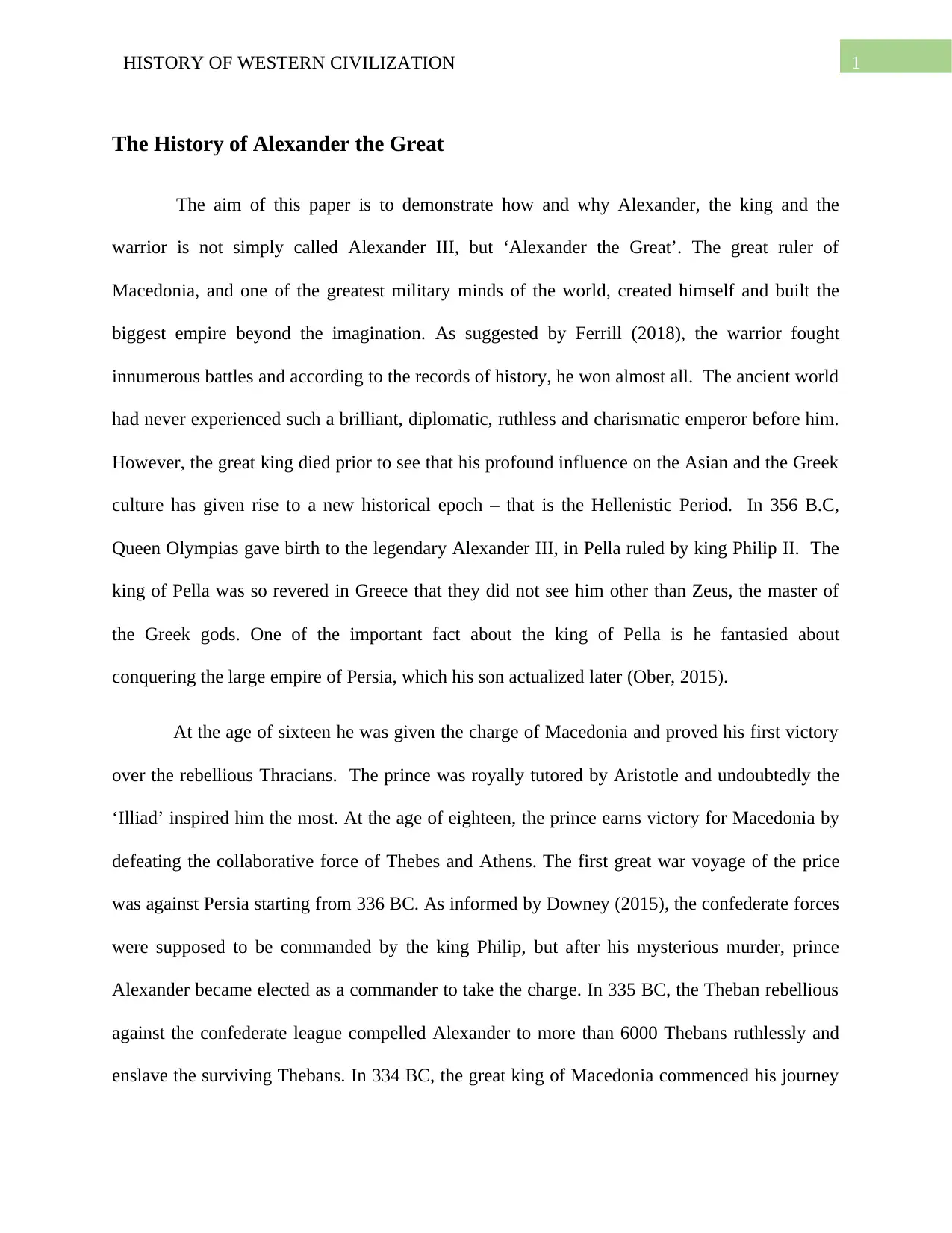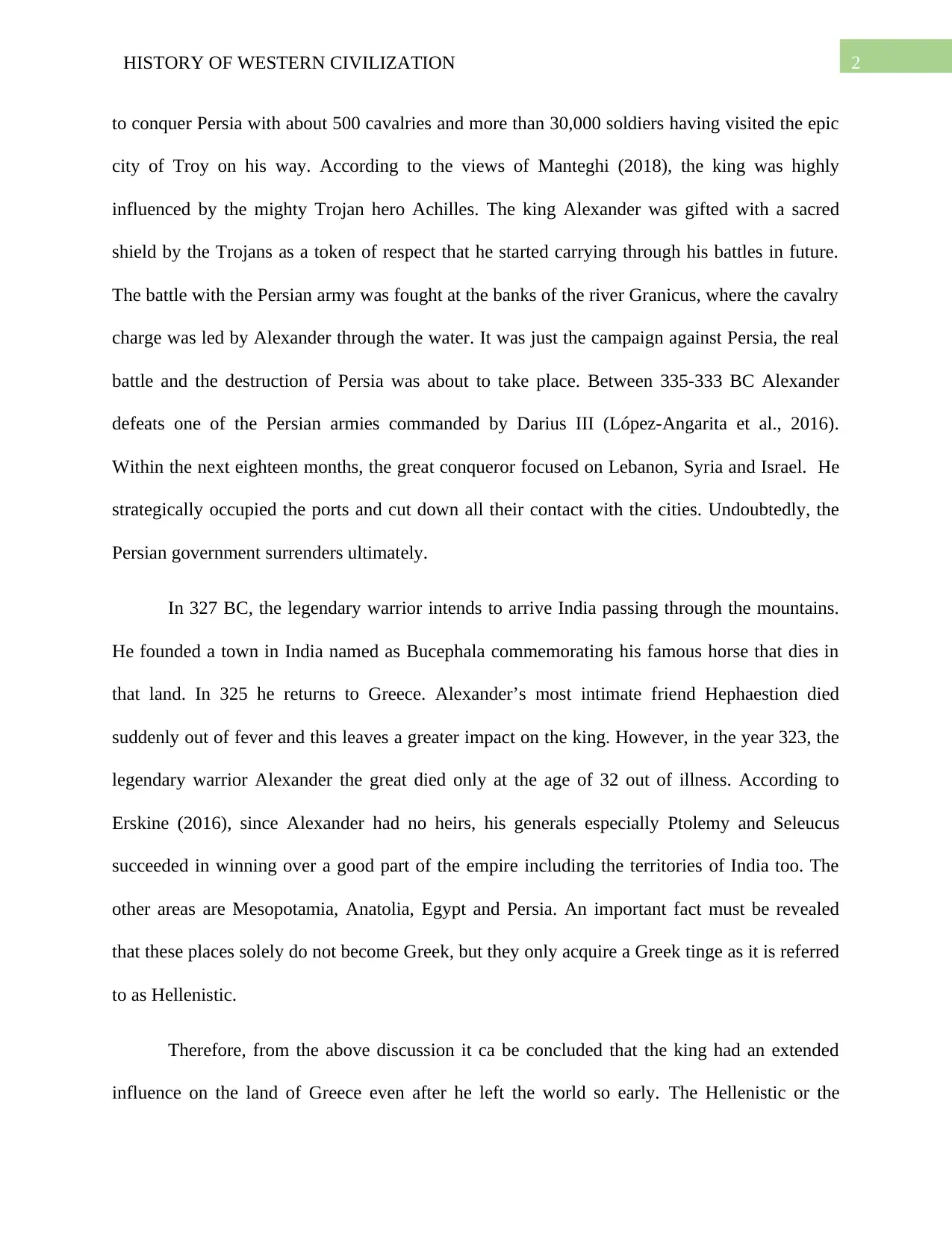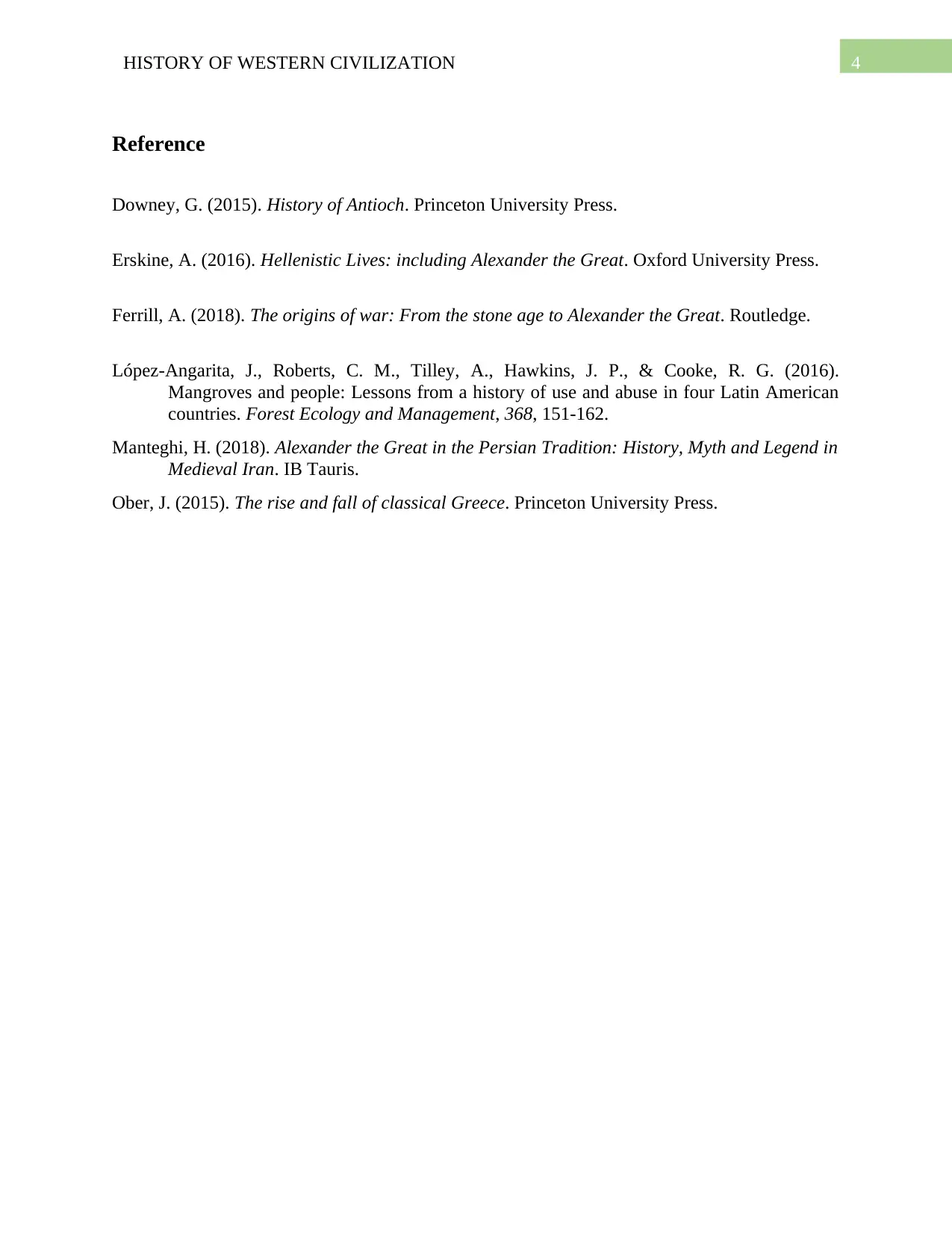History of Western Civilization: Alexander's Impact on the World
VerifiedAdded on 2021/09/14
|5
|1021
|341
Essay
AI Summary
This essay examines the life and historical significance of Alexander the Great, focusing on his military campaigns, leadership, and the creation of his vast empire. It explores his early life, his tutelage under Aristotle, and his victories against the Persians, including key battles like the Granicus. The essay highlights Alexander's strategic brilliance, diplomatic skills, and the impact of his conquests on the spread of Greek culture, leading to the Hellenistic Period. It discusses the lasting influence of Alexander, even after his early death, and the subsequent division of his empire among his generals, including Ptolemy and Seleucus. The essay concludes by emphasizing the enduring memory of Alexander the Great and his role in shaping the course of Western civilization.

Running Head: HISTORY OF WESTERN CIVILIZATION
History of Western Civilization
Name of the Student
Nam e of the University
Author Note
History of Western Civilization
Name of the Student
Nam e of the University
Author Note
Paraphrase This Document
Need a fresh take? Get an instant paraphrase of this document with our AI Paraphraser

1HISTORY OF WESTERN CIVILIZATION
The History of Alexander the Great
The aim of this paper is to demonstrate how and why Alexander, the king and the
warrior is not simply called Alexander III, but ‘Alexander the Great’. The great ruler of
Macedonia, and one of the greatest military minds of the world, created himself and built the
biggest empire beyond the imagination. As suggested by Ferrill (2018), the warrior fought
innumerous battles and according to the records of history, he won almost all. The ancient world
had never experienced such a brilliant, diplomatic, ruthless and charismatic emperor before him.
However, the great king died prior to see that his profound influence on the Asian and the Greek
culture has given rise to a new historical epoch – that is the Hellenistic Period. In 356 B.C,
Queen Olympias gave birth to the legendary Alexander III, in Pella ruled by king Philip II. The
king of Pella was so revered in Greece that they did not see him other than Zeus, the master of
the Greek gods. One of the important fact about the king of Pella is he fantasied about
conquering the large empire of Persia, which his son actualized later (Ober, 2015).
At the age of sixteen he was given the charge of Macedonia and proved his first victory
over the rebellious Thracians. The prince was royally tutored by Aristotle and undoubtedly the
‘Illiad’ inspired him the most. At the age of eighteen, the prince earns victory for Macedonia by
defeating the collaborative force of Thebes and Athens. The first great war voyage of the price
was against Persia starting from 336 BC. As informed by Downey (2015), the confederate forces
were supposed to be commanded by the king Philip, but after his mysterious murder, prince
Alexander became elected as a commander to take the charge. In 335 BC, the Theban rebellious
against the confederate league compelled Alexander to more than 6000 Thebans ruthlessly and
enslave the surviving Thebans. In 334 BC, the great king of Macedonia commenced his journey
The History of Alexander the Great
The aim of this paper is to demonstrate how and why Alexander, the king and the
warrior is not simply called Alexander III, but ‘Alexander the Great’. The great ruler of
Macedonia, and one of the greatest military minds of the world, created himself and built the
biggest empire beyond the imagination. As suggested by Ferrill (2018), the warrior fought
innumerous battles and according to the records of history, he won almost all. The ancient world
had never experienced such a brilliant, diplomatic, ruthless and charismatic emperor before him.
However, the great king died prior to see that his profound influence on the Asian and the Greek
culture has given rise to a new historical epoch – that is the Hellenistic Period. In 356 B.C,
Queen Olympias gave birth to the legendary Alexander III, in Pella ruled by king Philip II. The
king of Pella was so revered in Greece that they did not see him other than Zeus, the master of
the Greek gods. One of the important fact about the king of Pella is he fantasied about
conquering the large empire of Persia, which his son actualized later (Ober, 2015).
At the age of sixteen he was given the charge of Macedonia and proved his first victory
over the rebellious Thracians. The prince was royally tutored by Aristotle and undoubtedly the
‘Illiad’ inspired him the most. At the age of eighteen, the prince earns victory for Macedonia by
defeating the collaborative force of Thebes and Athens. The first great war voyage of the price
was against Persia starting from 336 BC. As informed by Downey (2015), the confederate forces
were supposed to be commanded by the king Philip, but after his mysterious murder, prince
Alexander became elected as a commander to take the charge. In 335 BC, the Theban rebellious
against the confederate league compelled Alexander to more than 6000 Thebans ruthlessly and
enslave the surviving Thebans. In 334 BC, the great king of Macedonia commenced his journey

2HISTORY OF WESTERN CIVILIZATION
to conquer Persia with about 500 cavalries and more than 30,000 soldiers having visited the epic
city of Troy on his way. According to the views of Manteghi (2018), the king was highly
influenced by the mighty Trojan hero Achilles. The king Alexander was gifted with a sacred
shield by the Trojans as a token of respect that he started carrying through his battles in future.
The battle with the Persian army was fought at the banks of the river Granicus, where the cavalry
charge was led by Alexander through the water. It was just the campaign against Persia, the real
battle and the destruction of Persia was about to take place. Between 335-333 BC Alexander
defeats one of the Persian armies commanded by Darius III (López-Angarita et al., 2016).
Within the next eighteen months, the great conqueror focused on Lebanon, Syria and Israel. He
strategically occupied the ports and cut down all their contact with the cities. Undoubtedly, the
Persian government surrenders ultimately.
In 327 BC, the legendary warrior intends to arrive India passing through the mountains.
He founded a town in India named as Bucephala commemorating his famous horse that dies in
that land. In 325 he returns to Greece. Alexander’s most intimate friend Hephaestion died
suddenly out of fever and this leaves a greater impact on the king. However, in the year 323, the
legendary warrior Alexander the great died only at the age of 32 out of illness. According to
Erskine (2016), since Alexander had no heirs, his generals especially Ptolemy and Seleucus
succeeded in winning over a good part of the empire including the territories of India too. The
other areas are Mesopotamia, Anatolia, Egypt and Persia. An important fact must be revealed
that these places solely do not become Greek, but they only acquire a Greek tinge as it is referred
to as Hellenistic.
Therefore, from the above discussion it ca be concluded that the king had an extended
influence on the land of Greece even after he left the world so early. The Hellenistic or the
to conquer Persia with about 500 cavalries and more than 30,000 soldiers having visited the epic
city of Troy on his way. According to the views of Manteghi (2018), the king was highly
influenced by the mighty Trojan hero Achilles. The king Alexander was gifted with a sacred
shield by the Trojans as a token of respect that he started carrying through his battles in future.
The battle with the Persian army was fought at the banks of the river Granicus, where the cavalry
charge was led by Alexander through the water. It was just the campaign against Persia, the real
battle and the destruction of Persia was about to take place. Between 335-333 BC Alexander
defeats one of the Persian armies commanded by Darius III (López-Angarita et al., 2016).
Within the next eighteen months, the great conqueror focused on Lebanon, Syria and Israel. He
strategically occupied the ports and cut down all their contact with the cities. Undoubtedly, the
Persian government surrenders ultimately.
In 327 BC, the legendary warrior intends to arrive India passing through the mountains.
He founded a town in India named as Bucephala commemorating his famous horse that dies in
that land. In 325 he returns to Greece. Alexander’s most intimate friend Hephaestion died
suddenly out of fever and this leaves a greater impact on the king. However, in the year 323, the
legendary warrior Alexander the great died only at the age of 32 out of illness. According to
Erskine (2016), since Alexander had no heirs, his generals especially Ptolemy and Seleucus
succeeded in winning over a good part of the empire including the territories of India too. The
other areas are Mesopotamia, Anatolia, Egypt and Persia. An important fact must be revealed
that these places solely do not become Greek, but they only acquire a Greek tinge as it is referred
to as Hellenistic.
Therefore, from the above discussion it ca be concluded that the king had an extended
influence on the land of Greece even after he left the world so early. The Hellenistic or the
⊘ This is a preview!⊘
Do you want full access?
Subscribe today to unlock all pages.

Trusted by 1+ million students worldwide

3HISTORY OF WESTERN CIVILIZATION
Greek-ish age lasts till the demise of Cleopatra in the 30 BC. After the death of the great king,
many events took place such as Macedonia got reduced to only the position of a province of
Rome after its invasion in the 197 BC. It is surprising to see that nothing can diminish the
memory of that undefeatable warrior.
Greek-ish age lasts till the demise of Cleopatra in the 30 BC. After the death of the great king,
many events took place such as Macedonia got reduced to only the position of a province of
Rome after its invasion in the 197 BC. It is surprising to see that nothing can diminish the
memory of that undefeatable warrior.
Paraphrase This Document
Need a fresh take? Get an instant paraphrase of this document with our AI Paraphraser

4HISTORY OF WESTERN CIVILIZATION
Reference
Downey, G. (2015). History of Antioch. Princeton University Press.
Erskine, A. (2016). Hellenistic Lives: including Alexander the Great. Oxford University Press.
Ferrill, A. (2018). The origins of war: From the stone age to Alexander the Great. Routledge.
López-Angarita, J., Roberts, C. M., Tilley, A., Hawkins, J. P., & Cooke, R. G. (2016).
Mangroves and people: Lessons from a history of use and abuse in four Latin American
countries. Forest Ecology and Management, 368, 151-162.
Manteghi, H. (2018). Alexander the Great in the Persian Tradition: History, Myth and Legend in
Medieval Iran. IB Tauris.
Ober, J. (2015). The rise and fall of classical Greece. Princeton University Press.
Reference
Downey, G. (2015). History of Antioch. Princeton University Press.
Erskine, A. (2016). Hellenistic Lives: including Alexander the Great. Oxford University Press.
Ferrill, A. (2018). The origins of war: From the stone age to Alexander the Great. Routledge.
López-Angarita, J., Roberts, C. M., Tilley, A., Hawkins, J. P., & Cooke, R. G. (2016).
Mangroves and people: Lessons from a history of use and abuse in four Latin American
countries. Forest Ecology and Management, 368, 151-162.
Manteghi, H. (2018). Alexander the Great in the Persian Tradition: History, Myth and Legend in
Medieval Iran. IB Tauris.
Ober, J. (2015). The rise and fall of classical Greece. Princeton University Press.
1 out of 5
Your All-in-One AI-Powered Toolkit for Academic Success.
+13062052269
info@desklib.com
Available 24*7 on WhatsApp / Email
![[object Object]](/_next/static/media/star-bottom.7253800d.svg)
Unlock your academic potential
Copyright © 2020–2026 A2Z Services. All Rights Reserved. Developed and managed by ZUCOL.

